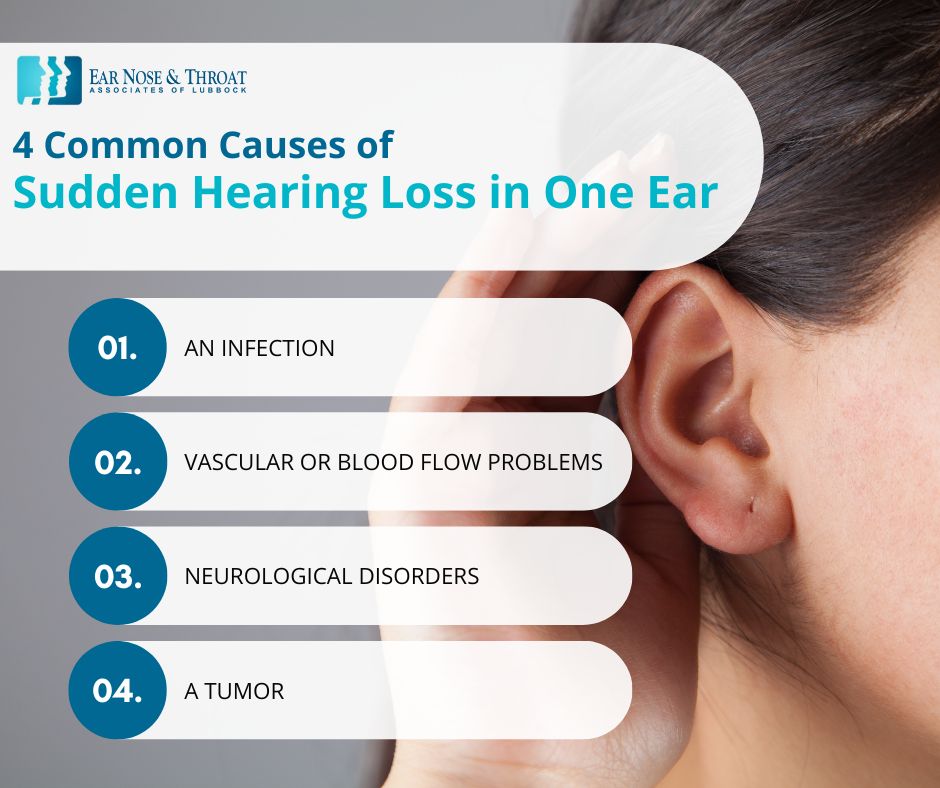Sudden Hearing Loss in One Ear: Causes and Treatments

If you have sudden hearing loss in one ear, you’re right to be concerned, but it’s best not to jump to conclusions.
Sudden hearing loss in one ear is relatively uncommon, but in most instances, it’s not permanent and is treatable. Here’s what you need to know to achieve the best chances of restoring your hearing.
How Serious Is Sudden Hearing Loss in One Ear?
Sudden hearing loss can happen to anyone, but it’s almost always in one ear, not both.
If you experience sudden hearing loss, you might notice it when you first wake up in the morning, or increasingly over two or three days. It might become apparent when you try to use the phone or your earbuds. Some people may even hear a popping sound before they lose hearing in one ear, while others experience vertigo or hear ringing in their ears.
Many people who experience sudden hearing loss in one ear worry that they might lose hearing in their other ear, too. Fortunately, people don’t commonly lose hearing in their other ear, so that’s not something you have to worry about.
However, sudden hearing loss in one ear is still considered a medical emergency, and you should see a doctor immediately.
An ENT doctor (or audiologist) can test your hearing with an exam called pure tone audiometry, and they can evaluate whether your hearing loss is due to an obstruction like ear wax or fluid buildup or nerve damage in the inner ear. They may perform an MRI to rule out a tumor and other neurological problems as the cause.
According to the Hearing Loss Association of America, about half of all people with sudden hearing loss will recover some or all of their hearing spontaneously within a week or two of losing it. The odds improve if you see a doctor. About 85% of those who receive treatment from an ENT recover at least some of their hearing.
What Are Some Common Causes of Sudden Hearing Loss in One Ear?

It’s not easy to determine what causes sudden hearing loss, and doctors can typically only pinpoint a specific cause about 15% of the time. In most cases, the hearing loss is caused by some type of harm to the inner ear, such as:
- An infection: This type of inner ear damage usually results from a viral infection, but, more rarely, it can come from a bacterial infection.
- Vascular or blood flow problems: Disorders that cause insufficient blood flow to the ear and cochlea (the hollow, spiral-shaped bone in the inner ear) may cause symptoms like fluctuating or permanent hearing loss. Examples include heart disease or ischemia, a condition where a part of your body doesn’t get enough blood.
- Neurological disorders: Research shows that hearing impairment can accompany a variety of neurological diseases, including multiple sclerosis, Alzheimer’s disease, Parkinson’s disease, Huntington’s disease, and autism spectrum disorder.
- A tumor: Pressure from an acoustic neuroma, a type of tumor that grows on the ear’s balance and hearing nerve, can also cause hearing loss. This type of tumor is rare, but an ENT doctor will still want to rule it out, just in case.
Of all the possible causes of sudden hearing loss in one ear, viral infections and vascular blood flow issues are the most common. An experienced ENT can determine the cause of your hearing loss and help you identify the best type of treatment for your situation.
Treatments for Sudden Hearing Loss in One Ear
The good news is sudden hearing loss is treatable, especially if you see an ENT immediately. When you go to the doctor, they’ll consider the possible causes of your condition and help you determine the appropriate treatment based on your symptoms and medical history.
There are usually two main treatments for sudden hearing loss in one ear:
- Oral steroids: Oral corticosteroids are the most common treatment for hearing loss. They work by decreasing inflammation and swelling in the ear to help the nerve recover. Doctors typically prescribe them in pill form. While oral steroids may have some adverse side effects like fluid retention, upset stomach, and high blood pressure, they’re highly effective in treating hearing loss.
- Intratympanic steroids: Sometimes, an ENT may want to deliver steroids directly into your ear. To do so, they first numb your eardrum and then use a very fine needle to inject a small amount of highly concentrated steroid medication into the middle ear. The medicine travels from the middle to the inner ear to decrease inflammation and swelling. Intratympanic steroid injections may be given in conjunction with oral steroids or as an alternative treatment for patients who can’t tolerate oral steroids.
For many years, doctors tried numerous other treatments to address sudden hearing loss, but none of them stood the test of time. The only treatment that made a significant impact was steroids.
See an ENT Doctor Right Away
If you’re experiencing sudden hearing loss in one ear, the best course of action is to see an ENT doctor right away. While the wait-and-see approach may seem attractive, it’s important to treat sudden hearing loss as early as possible to increase your chance of recovery.
With fast and proper treatment, the likelihood of restoring your hearing is very high. Although complete hearing recovery is uncommon, most people who get treatment from an ENT right away will recover some or most of their hearing.
Dr. Scolaro is a board-certified Otolaryngologist servicing the South Plains area. He has been practicing in Lubbock since 1990 and has earned a reputation as a skilled and experienced surgeon. He currently serves as the Medical Director for Covenant High Plains Surgery Center campuses, is a member of Covenant Health Partners and is an adjunct faculty professor for Texas Tech University Health Sciences Center School of Medicine. Learn more about Dr. Scolaro.
Categories:








